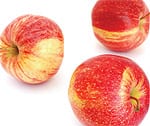Life Extension Magazine®
| In the past few years, hard science has begun to prove that the phrase “an apple a day keeps the doctor away” isn’t just a saying—it may be a fact. With its overwhelming load of powerful nutrients, antioxidants, fiber, and phytochemicals in every bite, the simple apple has been rising among nutritionists and scientists alike for its health potency. In addition, the apple peel has been shown to contain triterpenoids, compounds that possess strong anti-cancer activity, especially in preventing breast, colon, and liver cancer. The meat of the apple and the peel work together to help fight off many common debilitating illnesses and health problems, including lung cancer, cardiovascular disease, asthma, excess weight, Alzheimer’s, and dementia. In this article, we’ll learn how cutting-edge studies are proving the apple’s value as a health-enhancing fruit on an almost daily basis. The apple peel has been shown to contain triterpenoids, compounds that possess strong anti-cancer activity, especially in preventing breast, colon, and liver cancer. A Brief HistoryThere are over 7,500 types of apples (Malus domestica). A majority of them have been cultivated since the Iron Age, but historians have found evidence that apples were first farmed by humans in ancient Egypt. Apples were a favorite food of the ancient Greeks and Romans, with the Romans eventually bringing the apples to England. The apple was then brought to the United States by the Pilgrims in 1620, and almost four hundred years later, the United States produces approximately one-third of the world’s apple crop, with China being the world’s largest producer.1
Apples and Cancer PreventionThere have been many studies showing that the consumption of apples can be beneficial in lowering the risk of several cancers, but research groups have recently shown it has a strong impact in reducing the risk of lung cancer. In the Nurses’ Health Study and the Health Professionals’ Follow-up Study, fruit and vegetable intake was linked to a 21% reduced risk of lung cancer in women.2 Of the fruits and vegetables examined, very few of them had a significant effect individually, however apples were one of the fruits specifically associated with a decreased risk of lung cancer. Furthermore, a recent Finnish study that involved 10,000 men and women showed a strong relationship between higher intake of flavonoids and lower growth of lung cancer. Apples were the main source of flavonoid intake among the sample population, thus it was concluded that flavonoids from apples were most likely responsible for the lowered risk of the disease.2 Apples have also shown the ability to reduce the risk of breast cancer, according to a research study by Cornell University food scientists. The researchers treated a group of rats with a known mammary carcinogen, and after feeding them apple extracts, the number of tumors was reduced by 25% with the equivalent of just one apple a day and up to 61% with three apples a day.3 While consuming three apples a day may not be practical, supplementing with some of the nutrients found in apples, like quercetin and apple pectin, may provide a similar benefit. In fact, the high quercetin content of apples may be responsible for many of its health benefits, as quercetin is a known free radical scavenger that helps prevent disease. Heart Health, and the Power of PectinApples may prevent cardiovascular disease and promote heart health by lowering cholesterol and improving the function of blood vessels. In a large study of post-menopausal women, a direct correlation was found between the high level of flavonoids and the lowered risk of heart disease, with apples being the individual flavonoid-rich food contributing most to the results.2 Fiber is another component of apples that helps contribute to lowering the risk of heart disease. An average apple contains about 5 grams of fiber, and researchers have found that for every 10 grams of fiber added to the diet, there is a 14% reduction in heart illness.4 The reason apples are so potent in this area is due to their high pectin content. Pectin is a natural fiber found in fruits, and apples are the number one source for it. Pectin may also help fight diabetes because it supplies quercetin.2 Apples are also considered a “negative calorie” food, meaning that at 80 calories per average apple, you are burning more calories ingesting it than they provide.5 Bone ProtectionDue to the flavonoid called phloridzin, which is found only in apples, French researchers have discovered that eating apples may help to prevent osteoporosis and may increase bone density, especially in post-menopausal women.6
Apples and AsthmaMultiple studies have shown apple consumption to be associated with a decreased risk of asthma. These anti-asthma benefits are directly correlated to the flavonoids found in apples that we have discussed throughout this article. A recent study in Australia involving 1,600 people found that apple and pear intake was associated with a decreased risk of asthma and overall bronchial hypersensitivity. This builds upon information obtained in a previous study in the United Kingdom, where researchers surveyed nearly 600 people with asthma and 900 people without asthma. Apple intake produced a decreased risk of asthma, especially in those individuals who ate two apples per week.2
Perhaps more importantly, pregnant women who eat apples may protect their children from ever developing asthma. In research done by S.M. Willers of Utrecht University in the Netherlands, the diets of 2,000 women were tracked and the lung health of 1,253 of their children was documented.7 The apple was the only food that was recorded and eaten by the pregnant women that showed a consistent protective correlation with childhood wheezing or asthma. The children of moms who ate 4 apples or more per week were recorded as having a 53% lower chance of having doctor-confirmed asthma. Alzheimer’s PreventionA recent study at Cornell University discovered that the antioxidant quercetin found in apples helps to protect brain cells from oxidative stress. As Life Extension Magazine® readers know, oxidative stress is a tissue-damaging process linked to Alzheimer’s and other neurodegenerative disorders. In this particular Cornell study, groups of isolated brain cells of rats were exposed to different levels of quercetin and vitamin C. The cells were then exposed to hydrogen peroxide to help induce the damage that occurs with Alzheimer’s. Results showed that the cells treated with quercetin had much less damage than ones treated with vitamin C or without antioxidants at all, demonstrating that quercetin has an extremely strong effect in battling neurotoxicity.8 | |||||
| References | |||||
| 1. Grotto D. 101 Foods That Could Save Your Life. New York, NY: Bantam Bell; 2008. 2. Boyer J, Liu R. Apple phytochemicals and their health benefits. Nutri J. 2004 May12;3:5 3. Available at: www.allaboutapples.com/health/archives/science/cornell_study_finds_apples_may_reduce_breast_cancer_risk.htm. Accessed March 30, 2011. 4. Available at: http://www.nyapplecountry.com/nutritionheart.htm. Accessed March 31, 2011. 5. Goulart FS. Super Immunity Foods. McGraw-Hill; 2009. 6. Puel C, Quintin A, Mathey J, et al. Prevention of bone loss by phloridzin, an apple polyphenol, in ovariectomized rats under inflammation conditions. Calcif Tissue Int. 2005 Nov;77(5):311-8. 7. Available at: http://www.reuters.com/article/2007/04/12/us-apples-asthma-idUSCOL25916220070412. Accessed March 30, 2011. 8. Available at: http://www.scienceagogo.com/news/20041017040431data_trunc_sys.shtml. Accessed March 30, 2011. If you have any questions on the scientific content of this article, please call a Life Extension® Health Advisor at |




